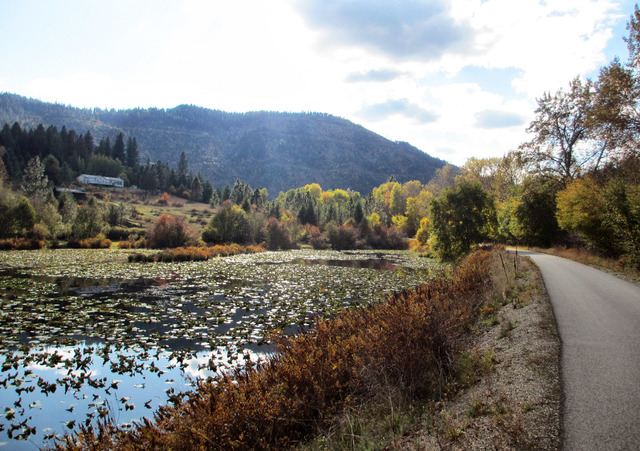Western US home to many Rails to Trails Hall of Fame routes

WALLACE, Idaho — In many parts of the country, abandoned train tracks have been repurposed into multi-use exercise trails. The best of them — a little more than two dozen routes in all — are in the Rail-to-Trails Conservancy Hall of Fame, and several of those are located in the Northwest region of the United States, in Idaho, Montana, Oregon and Washington.
Some routes are within earshot of an interstate or overrun with tumbleweeds. Others take you outside of city limits, perhaps following a river around a mountain pass, offering an opportunity to see and hear birds in remote marshlands or spot wildlife in an open meadow. And since the original tracks had gradient limits for locomotives, the trails are relatively flat, making for an easy bike ride, hike or run.
The Hall of Fame trails, selected between 2007 and 2011, were chosen for reasons of “scenic value, high use, trail and trailside amenities, historical significance, excellence in management and maintenance of facility, community connections and geographic distribution.”
The 72-mile (116-kilometer) Trail of the Coeur d’Alenes features beautiful views of the south end of Lake Coeur d’Alene, the South Fork of the Coeur d’Alene River and the peaks of the Bitterroot Mountains.
The track, formerly occupied by Union Pacific Railroad, goes from Plummer, Idaho, to Mullan, Idaho. Parts go through protected marshlands near the chain lakes region (east of the lake), giving trail users a chance to see blue heron, swans, bald eagles, moose, elk and other wildlife. In the fall, the trail comes alive with colorful autumn foliage from the aspen and larch trees.
History buffs can visit Idaho’s oldest standing building, the Sacred Heart Mission, which was built in the 1850s, or tour a silver mine in nearby Kellogg or Wallace.
Lodging is available along the way for multi-day trips, from campsites at Heyburn State Park to hotels and motels in towns.
Less than 20 miles (32 kilometers) from the trailhead for the Coeur d’Alenes trail is the trailhead for the Route of the Hiawatha, located just across the Montana border.
The Hiawatha trail, where the Milwaukee Railroad once ran trains, offers 10 tunnels and seven high trestles with views of mountains in Idaho and Montana. The Taft Tunnel is the main starting point for the trail and, for many, the highlight of the trip, but bring a headlamp because the pin-sized hole at the end of the tunnel doesn’t provide enough light for safe riding.
The 15-mile (24-kilometer) track is advertised for bicycle travel and the non-paved, packed gravel surface can be ridden on hybrid bike tires. Mountain bikes can be rented at Lookout Pass Ski Area, 7 miles (11 kilometers) from the trailhead. Visitors must purchase a trail pass for $10 ($6 for children) and have the option to pay for a one-way return trip on a bus ($6-$9).
Seattle’s Burke-Gilman Trail’s first sections were paved in 1974 after the Burlington Northern Railroad abandoned the line. It goes through the University of Washington, hugs northeastern Lake Washington and is popular for bicycle commuters, connecting many suburban cities with various Seattle neighborhoods.
The Springwater Corridor, outside of Portland Ore., runs through industrial and residential areas, agricultural fields, along the Willamette River, and near the Oaks Bottom Wildlife Refuge, Tideman Johnson Nature Park and Powell Butte Nature Park.